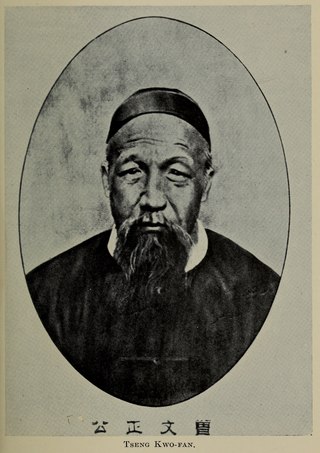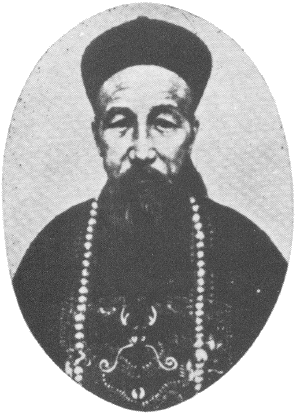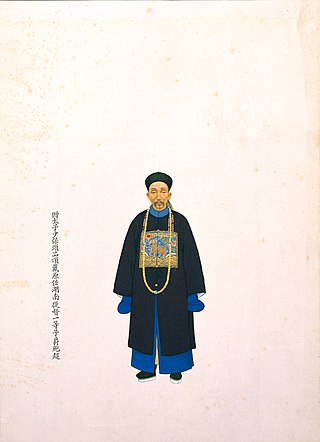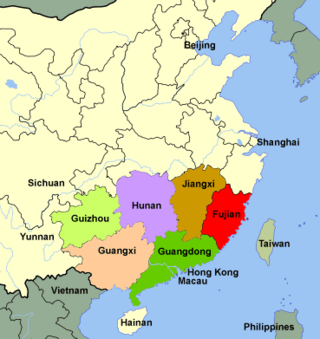Related Research Articles

The Taiping Rebellion, also known as the Taiping Civil War or the Taiping Revolution, was a civil war in China between the Manchu-led Qing dynasty and the Hakka-led Taiping Heavenly Kingdom. It lasted from 1850 until the fall of Tianjing in 1864, although the last rebel army was not wiped out until August 1871. The conflict resulted in approximately 20 to 30 million deaths, approximately one-tenth to one-twentieth of China's population at the time. The established Qing government won decisively, although at great cost to its fiscal and political structure.

The Xianfeng Emperor, also known by his temple name Emperor Wenzong of Qing, personal name Yizhu, was the eighth emperor of the Qing dynasty, and the seventh Qing emperor to rule over China proper, reigned from 1850 to 1861. During his reign, the Qing dynasty experienced several wars and rebellions including the Taiping Rebellion, Nian Rebellion, and Second Opium War. He was the last Chinese emperor to exercise sole power.

Zeng Guofan, Marquis Yiyong, birth name Zeng Zicheng, courtesy name Bohan (伯涵), was a Chinese statesman and military general of the late Qing dynasty. He is best known for raising and organizing the Xiang Army to aid the Qing military in suppressing the Taiping Rebellion and restoring the stability of the Qing Empire. Along with other prominent figures such as Zuo Zongtang and Li Hongzhang of his time, Zeng set the scene for the Tongzhi Restoration, an attempt to arrest the decline of the Qing dynasty. Zeng was known for his strategic perception, administrative skill and noble personality on Confucian practice, but also for his ruthlessness in repressing rebellions.

The Nian Rebellion was an armed uprising that took place in northern China from 1851 to 1868, contemporaneously with Taiping Rebellion (1851–1864) in South China. The rebellion failed to topple the Qing dynasty, but caused immense economic devastation and loss of life that became major long-term factors in the collapse of the Qing regime in the early 20th century.

Shi Dakai, born in Guigang, Guangxi, also known as Wing King or phonetically translated as Yi-Wang, was one of the most highly acclaimed leaders in the Taiping Rebellion and a poet.
Xiao Chaogui was an important leader during the early years of the Taiping Rebellion against the Qing dynasty of China. He was a sworn brother to Hong Xiuquan, the leader of the Taipings, and claimed to serve as a mouthpiece for Jesus Christ. Because of his importance to the rebellion, he was awarded the title of the "West King."
The likin or lijin was a form of internal tariff in the Chinese Empire and Republic, which was first introduced as a means of financing the largely locally recruited armies to suppress the Taiping Rebellion.

The Xiang Army or Hunan Army was a standing army organized by Zeng Guofan from existing regional and village militia forces called tuanlian to contain the Taiping Rebellion in Qing China. The name is taken from the Hunan region where the Army was raised. The Army was financed through local nobles and gentry, as opposed to through the centralized Manchu-led Qing dynasty. The army was mostly disbanded by Zeng after the re-capture of the Taiping capital at Nanking.

Bao Chao (1828–1886) was an eminent Han Chinese official, military Captain General, of the late Qing Dynasty in China. He raised the Xiang Army to fight effectively against the Taiping Rebellion and restored the stability of Qing Dynasty along with other prominent figures, including Zuo Zongtang and Zeng Guofan, setting the scene for the era later to fight against known as the "Nien Rebellion". He was known for his military perception.
Jiangnan Daying or the Jiangnan Battalion; was an army group assembled by the Qing dynasty. The army group consist of mostly Green Standard Army, and their goal was to quell the Taiping Rebellion around the Jiangnan region. The army group twice encircled Nanjing, the capital of the Taiping Heavenly Kingdom, but were defeated by the Taiping forces on both occasions.
The Battle of Nanjing (1853) began after the fall of Wuhan on March 8, 1853, and ended with the fall of the capital city of Nanjing on March 19, 1853, to Taiping troops, a few days after the Qing Government evacuated the city.
The Battle of Shanghai (太平軍二攻上海) was a major engagement of the Taiping Rebellion that occurred from June 1861 to July 1862. British and French troops used modern artillery on a large scale for the first time in China. Cannon fire inflicted heavy casualties on the Taiping forces, whose commander Li Xiucheng was wounded in the left leg by a shot fired from a cannon.

The Taiping Heavenly Kingdom (1851–1864) was a theocratic absolute monarchy which sought to overthrow the Qing dynasty. The Heavenly Kingdom, or Heavenly Dynasty, was led by Hong Xiuquan. Its capital was at Tianjing, present-day Nanjing. The unsuccessful war it waged against the Qing is known as the Taiping Rebellion.
Numerous rebellions against China's Qing dynasty took place between the mid-19th and early 20th centuries, prior to the abdication of the last Emperor of China, Puyi, in February 1912. The table below lists some of these uprisings and important related events.

The Red Turban Rebellion of 1854–1856 was a rebellion by members of the Tiandihui in the Guangdong province of South China.
Fu Shanxiang was a Chinese scholar from Nanjing who became Chancellor under the Taiping Heavenly Kingdom, a rebel Chinese state opposed to the Qing dynasty in the 1850s. Fu is known as the first female Zhuangyuan in Chinese history.
Su Sanniang, was a Chinese rebel during the Taiping Rebellion. The leader of a band of outlaws, she joined the rebellion with a band of 2000 soldiers.
Hong Xuanjiao, also known as Yang Yunjiao and Yang Xuanjiao, was a Chinese female general and rebel leader during the Taiping Rebellion. She was said to be the younger sister of the leader of Taiping Heavenly Kingdom, Hong Xiuquan, and is the wife of Xiao Chaogui, the West King. She led women into the battlefield against the Qing dynasty for the Taiping cause.
The Northern Expedition was a failed campaign by the Taiping Heavenly Kingdom against the Qing dynasty during the Taiping Rebellion. Its purpose was to capture Beijing and then complete an encirclement of northern and western China. Launched in May 1853, the Northern Expedition would travel from Jiangsu to Zhili before being destroyed in early 1855.
The Western Expedition was a campaign by the Taiping Heavenly Kingdom against the Qing dynasty during the Taiping Rebellion.
References
- Lily Xiao Hong Lee, Clara Lau, A.D. Stefanowska: Biographical Dictionary of Chinese Women: v. 1: The Qing Period, 1644–1911